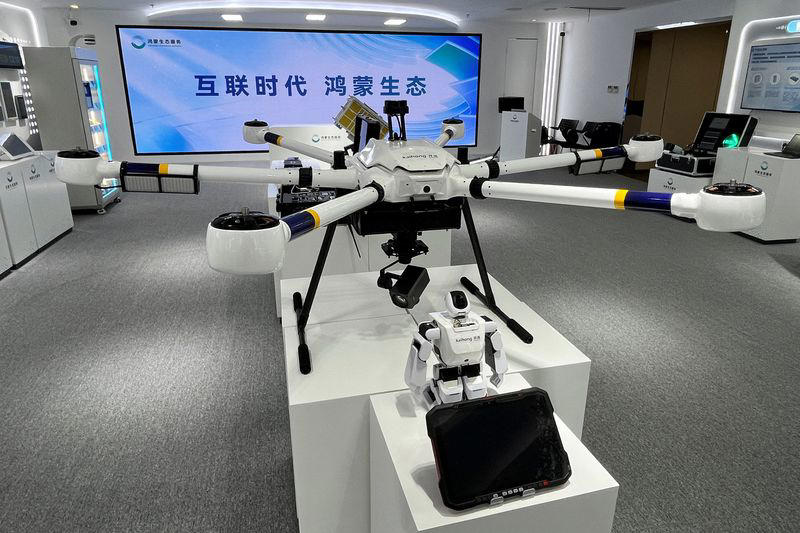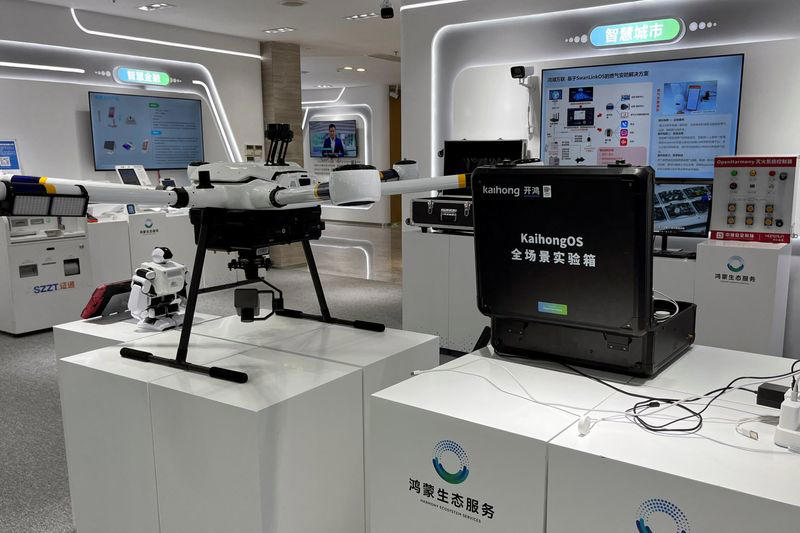Huawei's Harmony aims to end China's reliance on Windows, Android

FILE PHOTO: Devices running on OpenHarmony, an open-source version of Huawei's Harmony operating system, are displayed at the Harmony Ecosystem Innovation Centre in Shenzhen, Guangdong province, China April 9, 2024. REUTERS/David Kirton/File Photo
By David Kirton
SHENZHEN, China (Reuters) - Packed into a small room, a drone, bipedal robot, supermarket checkout and other devices showcase a vision of China's software future - one where an operating system developed by national champion Huawei has replaced Windows and Android.
The collection is at the Harmony Ecosystem Innovation Centre in the southern city of Shenzhen, a local government-owned entity that encourages authorities, companies and hardware makers to develop software using OpenHarmony, an open-source version of the operating system Huawei launched five years ago after U.S. sanctions cut off support for Google's Android.

FILE PHOTO: Devices running on OpenHarmony, an open-source version of Huawei's Harmony operating system, are displayed at the Harmony Ecosystem Innovation Centre in Shenzhen, Guangdong province, China April 9, 2024. REUTERS/David Kirton/File Photo
While Huawei's recent strong-selling smartphone launches have been closely watched for signs of advances in China's chip supply chain, the company has also quietly built up expertise in sectors crucial to Beijing's vision of technology self-sufficiency from operating systems to in-vehicle software.
President Xi Jinping last year told the Communist Party's elite politburo that China must wage a difficult battle to localise operating systems and other technology "as soon as possible" as the U.S. cracks down on exports of advanced chips and other components.
OpenHarmony is now being widely promoted within China as a "national operating system" amid concerns that other major companies could be severed from the Microsoft Windows and Android products upon which many systems rely.
"This strategic move will likely erode the market share of Western operating systems like Android and Windows in China, as local products gain traction," said Sunny Cheung, an associate fellow at the Jamestown Foundation, a U.S. defence policy group.
In the first quarter of 2024, Huawei's HarmonyOS, the company's in-house version of the operating system, surpassed Apple's iOS to become the second best-selling mobile operating system in China behind Android, research firm Counterpoint said. It has not been launched on smartphones outside China.
Huawei no longer controls OpenHarmony, having gifted its source code to a non-profit called the OpenAtom Foundation in 2020 and 2021, according to an internal memo and other releases.
But both the innovation centre and government documents often refer to OpenHarmony and HarmonyOS interchangeably as part of a broader Harmony ecosystem. The growth of HarmonyOS, expected to be rolled out in a PC version this year or next, will spur adoption of OpenHarmony, analysts said.
"Harmony has created a powerful foundational operating system for the future of China's devices," said Richard Yu, the chairman of Huawei's consumer business group, at the opening of a developer conference last week.
Huawei did not respond to a request for further comment.
SELF-SUFFICIENCY
Huawei first unveiled Harmony in August 2019, three months after Washington placed it under trade restrictions over alleged security concerns. Huawei denies its equipment poses a risk.
Since then, China has stepped up its self-sufficiency efforts, cutting itself off from the main code sharing hub Github and championing a local version, Gitee.
China banned the use of Windows on government computers in 2014 and they now use mostly Linux-based operating systems.
Microsoft earns only about 1.5% of its revenue from China, its president said this month.
Originally built on an open source Android system, this year Huawei launched its first "pure" version of HarmonyOS that no longer supports Android-based apps, in a move that further bifurcates China's app ecosystem from the rest of the world.
A report from the Jamestown Foundation last month said OpenHarmony's owner OpenAtom appeared to be coordinating efforts among Chinese firms to develop a viable alternative to U.S. technologies, including for defence applications such as satellites.
Beijing-based OpenAtom did not respond to a request for comment.
OPEN SOURCE
OpenHarmony was the fastest-growing open-source operating system for smart devices last year, with more than 70 organisations contributing to it and more than 460 hardware and software products built across finance, education, aerospace and industry, Huawei said in its 2023 annual report.
The aim of making it open source is to replicate Android's success in removing licensing costs for users and to give companies a customisable springboard for their own products, said Charlie Cheng, deputy manager of the Harmony Ecosystem Innovation Centre, when Reuters visited.
"Harmony will definitely grow into a mainstream operating system, and will give the world a new choice of operating system besides iOS and Android," he said. "China is learning from the West."
Google, Apple and Microsoft did not respond to requests for comment.
The Harmony ecosystem has seen strong support from Huawei's home city of Shenzhen, a city historically used as a trial site for policies later adopted across China.
Along with a Harmony centre that opened in the southwestern city of Chengdu, 10 more are expected in a further 10 cities, according to a Shenzhen centre presentation.
Key OpenHarmony developers include Shenzhen Kaihong Digital, headed by Wang Chenglu, a former Huawei employee known as Harmony's "godfather", and Chinasoft. Both have worked on infrastructure software, at Tianjin Port and for mines in China's top coal-producing province Shaanxi.
While OpenHarmony is largely confined to China, Brussels-based open-source group the Eclipse Foundation said it was using it to develop a system called Oniro for use in mobile phones and internet-of-things devices.
China's previous efforts to build major open-source projects have struggled to gain traction among developers, but Huawei's growing smartphone market share and extra work to develop a broader ecosystem gives Harmony an advantage, analysts said.
More than 900 million devices, including smartphones, watches and car systems are running on HarmonyOS, while 2.4 million developers were coding in the ecosystem, Huawei's Yu said this month.
"OpenHarmony will need more time and iterations so that these developers will be more confident to work with OpenHarmony," said Emma Xu, an analyst with research firm Canalys. "But the reputation, behaviour and confidence that HarmonyOS has achieved will definitely bring a positive effect."
(Reporting by David Kirton; Editing by Jamie Freed)
